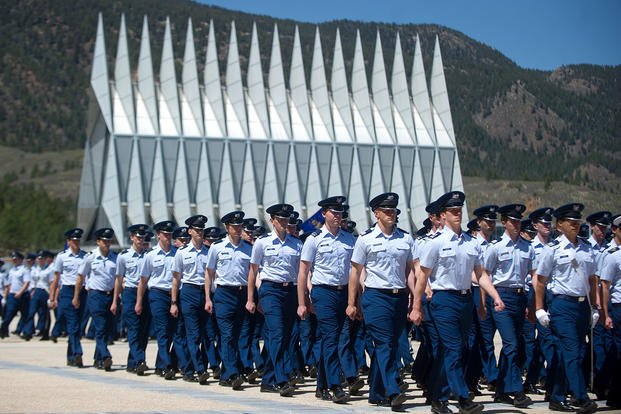The military academies of the Army, Navy and Air Force are bracing for a drawn-out court fight over whether they can continue to use race as a factor in admissions despite a Supreme Court ruling that initially gave them a pass.
In its historic June 29 decision, the high court effectively ended race-based affirmative action in public and private higher education based on a suit brought by the conservative advocacy group Students for Fair Admissions, but Chief Justice John Roberts in a footnote exempted the military academies.
Roberts in his "exception" footnote took notice of the government's argument that "race-based admissions programs further compelling interests at our nation's military academies."
Read Next: Soldiers at JBLM Authorized to Buy AC Units as Base Moves Toward Air-Conditioned Barracks
However, he also appeared to open the door to challenges to the military exception by noting that "this opinion also does not address the issue" of why the military academies should be treated differently "in light of the potentially distinct interests that military academies may present."
Students for Fair Admissions made clear last week that the group is preparing legal challenges to the military academy exception by putting up the website WestPointNotFair.org, soliciting potential plaintiffs who were rejected for admission by the academies.
The website states: "Were you rejected from West Point? Or the Naval Academy or the Air Force Academy? It may be because you're the wrong race." The website charges that the academies use "an applicant's race and ethnicity as a factor in admissions. That's unfair and unconstitutional" in light of the Supreme Court's recent ruling.
In an email response to questions from Military.com, Edward Blum, president of Students for Fair Admissions, said that the group "will not speculate on admission criteria other than to assert that race and ethnicity cannot be a factor in the acceptance or rejection of any applicant to our nation's service academies."
When asked about the group's claim to be adhering to the original goals of the civil rights movement, Blum, a former stockbroker backed by conservative donors, said "the founding principles of the American civil rights movement are that a person's race or ethnicity should not be used to help or harm those individuals in their life's endeavors."
The military academies have traditionally withheld comment on potential legal action and the U.S. Military Academy at West Point did not immediately respond to queries from Military.com. But public affairs offices at the U.S. Naval Academy in Annapolis, Maryland, and the Air Force Academy in Colorado offered statements defending their "holistic approach" to admissions.
The Naval Academy's statement said that "all candidates are evaluated using a holistic approach that includes many different factors and considerations associated with each applicant's individual record.
"Historically, race has been one of many non-determinative factors (such as geographic and socio-educational backgrounds, work experience, STEM interest/propensity, etc.) considered when holistically evaluating candidates for appointment consideration," the Naval Academy's statement said.
Along similar lines, the Air Force Academy's statement said that the school "as permitted by law, conducts a comprehensive, holistic evaluation of each applicant and their individual accomplishments, leadership qualities, and character before offering an appointment."
It also pointed to a "whole person" consideration that includes race, along with other personal attributes such as aviation interest, geographic and socio-economic background, STEM propensity, first-generation college, work and volunteer experience, and athletic and club participation.
The Pentagon issued a statement following the high court's June ruling saying that the Defense Department was evaluating the implications of the court's decision.
"We rely on a pipeline of highly qualified American patriots from all walks of life and all backgrounds, which is crucial for our national security," the statement said.
Defense Secretary Lloyd Austin, a West Point graduate, retired four-star general and the first Black defense secretary, and leaders of all the services also have spoken frequently on boosting diversity in the military and the need to have an officer corps that reflects the diversity of the enlisted ranks.
Currently, the military relies on a race-conscious admissions process that has been in place for years both in military academy admissions and in recruiting from civilian universities, according to the government's brief in the Supreme Court case.
In a June 21 release, the U.S. Military Academy said that West Point's incoming class of 2027 has more than 1,240 U.S. citizens and 14 international students, including 247 women and 463 minorities.
The class was selected from a pool of nearly 12,600 applicants. Minority enrollment, roughly 38%, included 127 African Americans, 137 Hispanic Americans, 170 Asian Americans and 18 Native Americans, the release said.
In the military, about 69% of active-duty troops identify as white, while about 31% identify as part of a racial minority group, according to a 2021 Defense Department report on demographics.
The report also said that about 75% of active-duty officers identified as white.
In assessing the impact of the Supreme Court's decision on the military, former judge advocates general stressed the need to continue efforts to boost diversity in the military while noting the difficulty of gauging how the court would deal with a challenge to the exception from Students for Fair Admissions, should the group build a case that reaches the high bench.
Both Gary Solis, a Marine platoon and company commander in Vietnam and later a judge advocate general, and Rachel VanLandingham, a 1992 Air Force Academy graduate and former JAG, noted the Supreme Court's traditional deference to the military with its set of traditions and its own code of law in the Uniform Code of Military Justice.
Solis, who taught the law of armed conflict at West Point and served on the admissions committee, said, "I can tell you that West Point, like the other academies, is exceedingly anxious to get more African Americans who are qualified."
At West Point, "they're seeking greater inclusivity and it ain't easy," Solis said. The academy wants more African Americans "to be in the Army and to be seen as assets to the Army and representative of what the Army is, and I think that's a very good idea. I say leave the military academies alone -- they're trying to do the right thing."
VanLandingham, a retired lieutenant colonel, said there is definitely precedent for the Supreme Court to uphold Chief Justice Roberts' "military-only exception for race conscious admissions at military schools of higher learning."
She said that the "men and women at the academies are on active duty, subject to the UCMJ, with school and lodging paid for, and a salary. They ain't university kids, they ain't ROTC cadets. They are different, and in a different setting. So, I can see the court upholding this narrow exception" if a suit reaches the high court.
"But I can also see them striking it down, given the court's current ideological marriage to the far right, but I currently lean toward them upholding it," VanLandingham said.
She said that the Supreme Court in previous cases "has applied the Constitution differently to the military in numerous contexts, such as freedom of speech as well as freedom of religion, giving the military much greater latitude to operate based on military assessments of needs."
-- Richard Sisk can be reached at Richard.Sisk@Military.com.
Related: Military Academies Exempted from Supreme Court Ruling Ending Affirmative Action













